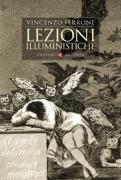Lezioni illuministiche

In this concise and powerful book, one of the world’s leading historians of the Enlightenment provides a bracing and clarifying new interpretation of this watershed period. Arguing that philosophical and historical views of the era have long been hopelessly confused, Vincenzo Ferrone makes the case that it is only by separating these views and taking an approach grounded in social and cultural history that we can begin to grasp what the Enlightenment was—and why it is still relevant today.
Examining Kant, Hegel, Marx, Nietzsche, Horkheimer, Adorno, Foucault, and Pope Benedict XVI, Ferrone shows how transhistorical, philosophical interpretations of the Enlightenment have diverged from ones based on careful historical reconstructions of the ideas, practices, and institutions of eighteenth-century Europe. He then offers a new reading of the Enlightenment, arguing that it was “the laboratory of modernity,” a profound and wide-ranging cultural revolution that reshaped Western identity, reformed politics through the invention of human rights, and redefined knowledge by creating a critical culture. Not confined to a group of radical elites, these new ways of thinking gave birth to new values that spread throughout society and changed how everyday life was lived and thought of.
Original and provocative, The Enlightenment provides a compelling reevaluation of the true nature and legacy of one of the most important and contested periods in Western history. And, in a new afterword, Ferrone describes how his argument challenges the work of Anglophone interpreters of the Enlightenment, including Jonathan Israel.